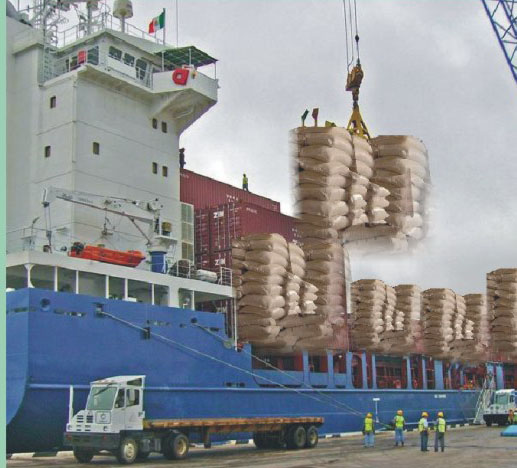Exploring money-making opportunities in sesame seed
The non-oil export is currently the highest contributor to Nigeria’s foreign exchange earnings. The latest statistics from the Nigerian Export Promotion Council shows that Nigeria raked in N345bn as proceeds from the non-oil exports from January to December 2010.
One agricultural produce that has been identified by experts as a money spinner is sesame seed. The Director-General, Raw Materials Research and Development Council, Prof. Peter Onwalu, says Nigeria currently earns about $20m annually through the exportation of sesame seeds.
Sesame seed is an important oil seed crop, which is believed to have originated from tropical Africa. Currently, about 25 per cent of the world sesame seed is planted in Africa. Nigeria is one of the major producers of the crop in the continent.
The crop, which is one of the oldest cash crops in Nigeria, is produced in about 21 states of the federation but it is predominantly found in Benue and Jigawa states.
In terms of export value, sesame seed ranks second to cocoa in the volume of export and foreign exchange earnings. Nigeria is currently among the top five largest producers and exporters of the commodity in the world with an estimated production of over 120,000 metric tonnes annually. The major market destinations for Nigeria‘s sesame seed are Japan, Korea, China, Turkey and the Middle East.
According to the Executive Director/Chief Executive Officer, Nigerian Export Promotion Council, Mr. David Adulugba, there is a growing demand for sesame seed from Nigeria in the international market.
He says, “Currently, there is a high demand for sesame seed from Nigeria at the international market. Japan is one of the largest importers of sesame seed from Nigeria. Few years ago, they imported over 20,000 metric tonnes. There is also a huge demand for sesame seed from Nigeria in Asia, Middle East and Europe.
“In order to meet this demand, we are working out modalities to jerk up the production. Also, we will partner small and large scale investors, who want to take advantage of the export potential of sesame seed in Nigeria. Currently, there are various opportunities for entrepreneurs either directly in the area of farming or as export merchants by buying the produce and exporting it.”
Adulugba stresses that NEPC also provides export incentives for prospective entrepreneurs wishing to take advantage of the investment opportunity in sesame seed exportation.
He says, “We are partnering the World Trade Organisation to expand Nigeria’s export of sesame seeds through capacity building for prospective investors. The project is specifically aimed at addressing some urgent needs relating to quality control in the supply chain of the sesame seed to the level that meets the requisite standards of the markets in the European Union and the United States of America.”
Similarly, Onwalu says a lot of opportunities exist for entrepreneurs in the business. He also notes that the RMDC provides assistance for any genuine investors.
He says, “The country has the potential to beat Sudan in sesame seed production in view of the large and suitable land for its production. The North Central states of Benue, Nasarawa, Niger and Kogi and even the North Eastern and North Western states can take advantage of this opportunity to increase their revenue generation from the non-oil sector.
“Through the Agricultural Raw Materials Boosting Programme, we have included the promotion of increased production of industrial crops using members of the Out-growers Association of Agro Commodities who are the producers of food and raw materials for local processing. The programme started in 1991 as a follow up to a recommendation from a Techno-Economic Survey, which revealed that most industries were operating below installed capacities due to lack of raw materials in sustainable quantity and quality.
“The agro raw materials boosting programme is an intervention package to promote the use of improved seeds and seedlings to boost the production of selected agro-raw materials to bridge the gaps between raw materials demand and supply.”
As regards profitability, exportnigeria.blogspot.com says the export free on board price of sesame seed varies from $900 to $1,400 per metric tonne, depending on the type and form of the sesame seed and the negotiation made with the buyers.
Specifically, it states, “Local price per metric tonne of sesame seed varies from N80,000 during the peak season to about N120,000.00 at the off-season. However, local price, when delivered in Lagos, could range from N130,000 to N160,000.”
source : Punch






Anaekwe Everistus Nnamdi
October 15, 2011 at 6:24 pm
Get these report and read more about other reports our platform at website http://www.marketreportportal.com
Marketreportportal.com is an online market research report portal that stocks the very latest titles on market research report, country report, business plan, feasibility reports and other such business information products cutting across different sectors of the economy.
To sale your market research reports on our platfor, please do click on the link below
http://www.marketreportportal.com/become.php
Anaekwe Everistus NnamdiCEOMarket Report Portal